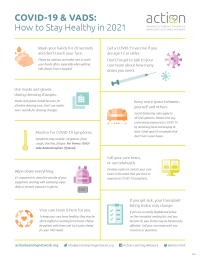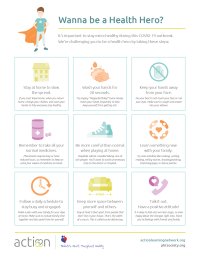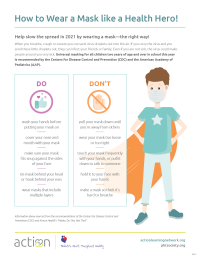COVID-19
 To keep our children and communities safe during the COVID-19 pandemic, it is important to stay informed with updated research and medical insights.
To keep our children and communities safe during the COVID-19 pandemic, it is important to stay informed with updated research and medical insights.
Here’s what we know: Although more common in adults, children can also get the virus that causes COVID-19. Common symptoms may include fever, cough, runny nose, diarrhea, vomiting, loss of smell, or headache. Most COVID-19 infections in children are mild or get better with medical care.
It’s important for all of us to help prevent the spread of COVID-19, especially among vulnerable child populations. Children and adults can reduce their risk of exposure by wearing a mask in public, social distancing, and washing hands frequently.
Some children and adult patients can experience more serious problems as a result of COVID-19. These include myocarditis or multisystem inflammatory syndrome (MIS-C):
- Myocarditis: Just like other viruses, COVID-19 can cause myocarditis, a rare inflammation of the heart muscle. Symptoms may include chest pain, irregular heart rate, difficulty breathing, loss of appetite, fatigue, and/or swelling in the legs, feet, or ankles. Most children with myocarditis get better with medical care. Contact your care team if you notice myocarditis symptoms.
- Multisystem Inflammatory Syndrome (MIS-C): Research is starting to show that many children with multisystem inflammatory syndrome (MIS-C) also have the virus that causes COVID-19, or had been around someone with COVID-19. MIS-C syndrome typically happens less than 2 weeks after a COVID-19 infection. MIS-C is a rare but more serious complication associated with COVID-19 and can even be lethal. MIS-C can affect different body parts and cause inflammation in the heart, lungs, kidneys, brain, skin, eyes, or gastrointestinal organs. Most children diagnosed with this condition have gotten better with medical care. If your child is showing any emergency warning signs—including trouble breathing, pain or pressure in the chest that does not go away, new confusion, inability to wake up or stay awake, bluish lips or face, or severe abdominal pain, call 911 or go to the emergency room.


